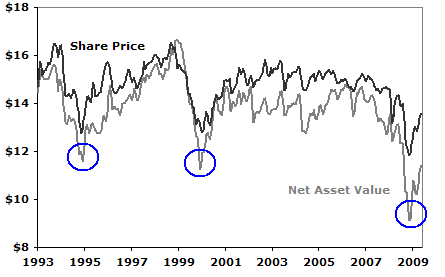| Home | About Us | Resources | Archive | Free Reports | Market Window |
These Tax-Free Bonds Are Still a Great BuyBy
Thursday, June 18, 2009
"With an economy larger than Canada's or Brazil's, [it is] is too big to fail..."
Too big to fail. That's getting to be a weekly headline here in the States. The big economy in the quote above is the state of California's. In case you didn't realize, California by itself would make for the world's eighth-largest economy. Things are crazy out there. The state faces a $24 billion budget shortfall... and big tax hikes ahead. Nevada, Florida, and Arizona are in the same shape. You might think all this budget trouble means it's a bad time to loan money to these guys. But I'm actually urging readers of my Retirement Millionaireadvisory to keep on loaning money to states – to keep buying "municipal bonds." Understanding "muni bonds" is simple. In order to fund things like highway projects and water systems, states borrow money from individual investors. To entice folks to invest with the government, interest earned on these bonds is exempt from federal taxation. That means if California's muni bonds are paying out 6%-7% in interest payments, it's the equivalent of getting a 9%-10% yield on any other kind of interest-bearing investment. You also have the extraordinary power of the government looking out for you. The alternative to you not getting paid is for the state or city to go bankrupt. Right now, though, investors are scared of muni bonds. You see, back in 1975 and 1978, New York City and Cleveland defaulted on their debt. People are worried that's going to happen again. But folks are missing a big thing here: If Washington D.C. isn't going to let GM, AIG, or Citibank go belly-up, do you really think they'll let a big state go bankrupt? I'm not in favor of any bailout, but that's the game we're playing. My favorite way to own muni bonds is through "closed-end funds." These investment vehicles aren't like regular mutual funds... They can trade for premiums and discounts when investor sentiment gets out of whack. Oftentimes, you can use closed-end funds to buy a dollar's worth of assets for 85 or 90 cents. And that's where the opportunity is today: closed-end muni-bond funds that are trading for much less than their "net asset value." Right now, we can buy several closed-end California municipal funds for as cheap as 84 cents for every dollar of assets. Consider the last two times the markets did this. In 1995, you could buy $1 of muni bonds for 85 cents. And in 1999, a dollar's worth of these bonds cost 86 cents. The chart below of MCA (a BlackRock fund of California munis) shows these extremes. Every time the gray line dropped below the black one, you could buy munis at a discount.
As you can see, buying when the fund traded at a discount led to capital gains within a couple years. Not to mention the tax-free income along the way. The state of California is in trouble. The price (low) and yields (high) of its municipal bonds show it. But you can be sure Obama and the current federal government will not let the state slide into the ocean and default on its obligations to investors. This provides us with an incredible opportunity to buy high-yielding discounted municipal paper. A lot of closed-end funds own nothing but California bonds, including MCA. If you're a real contrarian, consider buying these. Many are going for double-digit discounts. If you want a safer bet, take a look at more diversified funds that own bonds issued by many different states. Bottom line: Don't get scared out of these tax-advantaged bonds. They're still a good source of income at arm's reach from the taxman. Here's to our health, wealth, and a great retirement, Dr. David Eifrig P.S. I've actually found more than a dozen great ways to get tons of extra income for retirement, often without even investing any money. For example, there's one program that gives retired homeowners lots of extra money – without making any investment. There's also an "extra-income" program for retirees who have regular insurance policies. The point is, if you need more money for retirement, you should definitely have a look at the research I've done. Read more on all of these programs here.
Further Reading:
Where to Find the Best "Bank Accounts" in America Market NotesTHE EASY MONEY HAS BEEN MADE IN OIL
It didn't take long for our extreme gold/oil ratio reading to correct itself.
In late December, we recommended turning bullish on crude oil. Crude was ridiculously cheap relative to its commodity cousin, gold. We measured the cheapness with the gold/oil ratio. The gold/oil ratio is the amount of crude oil one ounce of gold will buy. If gold is $800 an ounce and oil is $80 per barrel, the ratio is 10. If gold is $800 and oil is $40, the ratio is 20. When the ratio dips below 10, gold is cheap relative to crude oil, and it's a safe bet gold will outperform oil over the following year. When the ratio climbs above 20, the opposite is true... crude oil is cheap. In December, the ratio reached an extreme reading of 24. We compared it to a teapot set on a hot burner. It was only a matter of time before the pressure was released and big gains in crude followed. Crude has doubled since then. Gold has moved sideways. And as you can see, the teapot is off the boil. The ratio is a more normal 13... and the easy, early money has been made. |
In The Daily Crux
Recent Articles
|


